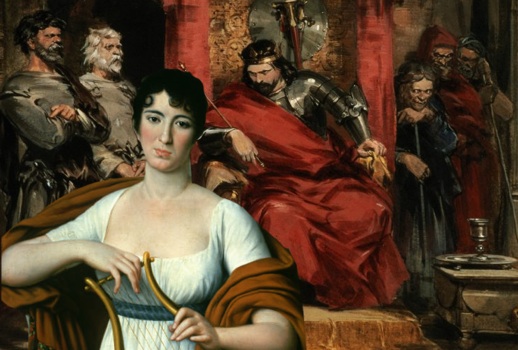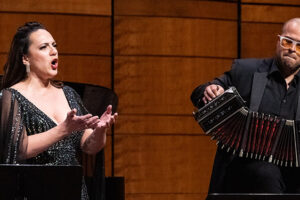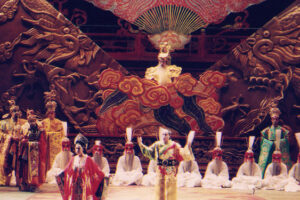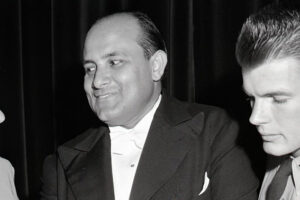

This reminded me of Anna Russell, who used to summarize (and sing) Verdi’s Amleto. Verdi, as we all know, never composed an Amleto, but, as Anna put it, “I wouldn’t dream of allowing that to stand in my way.”
So I’ve been puzzling how the genial Rossini (with so little of blood and thunder in his makeup) would ever have made an opera from Macbeth, a play that had not yet been translated into Italian in his compositorial day.
The Witches, for instance. I imagine they would have been a bit like the wicked stepsisters in Rossini’s Cenerentola: selfish, vain, capricious. They would refuse to predict anything until their taste for flowers, chocolates and new hats had put them in the right mood.
Macbeth, who—my dear friend Thea Cooke of the Donizetti Society suggests—would be a trouser (or kilt) role, sung by a coloratura contralto, would, after the prophecies, brood in a long, flowing melody on the acquisition of Cawdor and kingship, but his pal Banquo, a basso buffo, would sing a merry patter in counterpoint about all his descendants and their pranks when Time had made them kings of Scotland.
Lady Macbeth, undoubtedly composed for Isabella Colbran, Rossini’s first wife, would enter warbling Macbeth’s letter. Letting it fall from her hand, she would burst into a happy waltz-song about the joys of being a queen. (Everyone is enjoying the prophecies except Macbeth. Hmmm.) This would be followed by a cabaletta, repeated with ornaments, invoking those jolly owls and demons to share her pleasure.
Enter King Duncan with a troupe of skipping Scottish bards (like the ones who welcome Rodrigo in La Donna del Lago) to sing a flirtatious little duet with Lady M. She sends him bouncing off to bed. Alone on stage after dinner, (“Is this a coltello that I see before me?”), Macbeth sings a sad romanza about the good old days when regicide never entered his head.
The great post-mortem duet of soprano Lady and contralto Macbeth, no doubt including the two of them trilling in thirds (to indicate their terror of discovery), will be a high point of the act, followed presently by Macduff’s discovery of the bloody royal corpse and a grand concertato sextet in which each singer expresses metaphorical horror by a different sound effect. Triple crescendo, repeat (if there’s time), and the curtain falls on general anarchy and hither-and-thither.
Act II: Queen Lady Macbeth (her actual historic name, by the way, was Gruoch, which cannot possibly be sung in Italian or any other language, so we will call her Margherita henceforward) sings a rather ironic prayer for the soul of the soon-to-be-dispatched Banquo. (Often cut. As is Banquo.)
The chorus of murderers—well, it’s hard to imagine even Rossini being sillier than Verdi at this point. Perhaps they will have individual couplets gloating about what they’ll do with the money after Banquo has been slain and Macbeth has paid them off. Banquo and his son, Fleance (boy soprano), enter, and Banquo sings a brindisi about the food and drink at the royal table soon to follow. The murderers join in and soon Banquo discovers his mistake. Fleance escapes.
Great choral entrance of King Macbeth and Queen Margherita, shouts of joy from everyone, then trombones and drums and such herald the ghastly apparition of the Ghost of Banquo (as in Semiramide). Everyone realizes something is awry, and the Macbeths are quite beside themselves. The Ghost, however, contents himself with a general “Woe to Scotland” imprecation, and departs.
A withered Scottish heath, picturesque lochs in the distance. The three Witches are singing an old Scottish folk song in Neapolitan dialect (standing in for Gaelic). Macbeth enters and sings a witty quartet-rondo with them, as he asks each witch in turn a significant question (to the same melody) and they each respond with a different melody (but the same meter and rhyme scheme), concluding in quartet: “No, no, no, no, no! You can’t be slain by any man who’s yet of woman born!” And so on. All very jolly, and only the flute playing, in a minor key, Banquo’s song from the first scene about all his kingly descendants, casts a shadow on the proceedings.
Act III: Macduff and Malcolm (both coloratura tenors) are preparing to invade Scotland when a messenger brings news that all Macduff’s family have been murdered. This naturally calls for a spectacularly aggressive bravura aria of Vendetta, with a chorus to sing along while cutting the trees of Birnam Wood.
To the astonishment of her ladies in waiting (who have just sung a song in praise of whiskey and flirtation on chilly nights), the Queen enters their hall, fast asleep. She goes to the enormous harp in the corner, and (still sleeping) sings of how little fun she’s actually having as queen, and how murder simply isn’t worth the trouble, perhaps a bit of barcarolle to describe the water necessary to clean her hands. In between stanzas, the ladies in waiting sing a chorus about how terrified they are.
Outside the window, a passing gondolier sings of taking the alta ria, reminding the Queen that she has undoubtedly chosen the bassa ria. Before she goes, with a last despairing sigh, she sings two verses of a cabaletta (with cadenza) on the disquiet of her sleep lately.
On the battlements, Macbeth sings a recitativo accompagnato on his bleak prospects for a long and happy reign. A lady in waiting reports that the Queen has killed herself. A messenger enters with news that Birnam Wood is advancing on the castle. Anguish and resolve characterize the ensuing martial aria (with bagpipe obbligato), sung with ornamental ascending chromatic runs that must be performed while the soldiers arm him for battle. At the conclusion, he draws his sword and leads them off.
A delightful orchestral interlude (with ballet on stage) describes the ensuing battle, including a pas de dix for ballerinas in plaid ballet skirts and sporrans waving swords at each other. The tunes hop around from violins to oboes to clarinets to trumpets and is interrupted by a storm (orchestrated), but at last Macbeth is slain— or, in an alternate ending composed at the demand of the censors—surrenders to Macduff, whereupon Malcolm pardons him, and Macbeth resolves to enter a monastery to spend the rest of his life in repentance.
Ecstatic Alpine melody of peace descends on all Scotland as the curtain falls.
























Comments